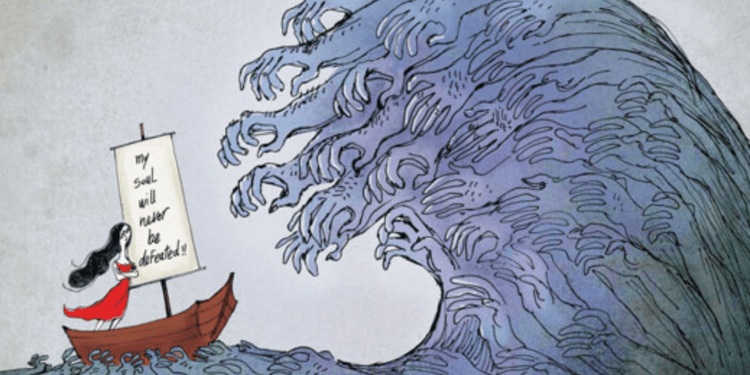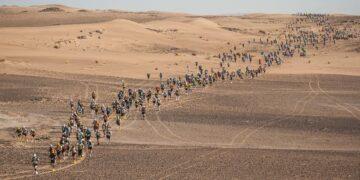Contents
Questo articolo è disponibile anche in:
An important Egyptian voice after the Arab Spring of 2011, Doaa el-Adl is a cartoonist loved and criticized for her cartoons with strong socio-political tones of accusation. Her career is studded with awards, and she is the leading female exponent in the field of satirical cartoons.
Who is Doaa el-Adl?
Born in 1979 in Damietta, in northern Egypt, she embarked on a working career that fully embraced her passion for drawing. Doaa el-Adl is today the best-known satirical cartoonist in Egypt, but she is equally well-known abroad.
She studied fine arts at the University of Alexandria and began working for various newspapers as an illustrator and columnist cartoonist. She made children’s drawings and satirical comics for al-Dustur, Rose al-Yusuf, Sabah el-Khayr, Qatr el-Nada and ‘Alaa el-Din. Currently, she draws for al-Masry al-Youm newspaper.
Doaa el-Adl is a sharp cartoonist, and her interests cover social, political, and religious themes. What she does consists of selecting topics of public interest, reworking them, and eventually converting them into cartoons. Among her favorite subjects are women; they are the protagonists of many of her works, which confirms her engagement in favor of female emancipation and the fight against gender stereotypes.
In 2017, she published her first book (and so far the only one), entitled “50 Drawings and More on Women“, consisting of an album of cartoons already published in the newspapers for which she had been working, as well as a series of unpublished drawings.
The Egyptian cartoonist is, therefore, a deeply “committed” artist, and thanks to her undoubted artistic skills she has won numerous both national and international awards. These include the 2009 Journalist Union Prize in Egypt, won for the first time by a woman, and several other national and European awards.
Doaa el-Adl is internationally renowned and has participated in numerous exhibitions held in France, Italy, Spain, Belgium, Denmark, Tunisia and Egypt.
The works and the satire
As mentioned above, Doaa el-Adl addresses political, social and religious themes; further, in her drawings it clearly appears the will to celebrate women’s emancipation, as well as to criticize political and social injustice in Egypt. It is no coincidence that the cartoonist chose to expose herself and support the revolution of 2011.
These issues are strongly felt by the artist, who fights against threats to freedom of expression and against female discrimination in a male-dominated and patriarchal society. Indeed, Doaa has produced a series of cartoons where she has exposed both the unequal treatment of women and men, and a paradigm shift linked to the stereotypes that society assigns to women.
Scissors, for example, are a recurring symbol in some of the artist’s drawings. These become a metaphor for violence in one of her well-known cartoons: a man, of reduced dimensions, climbs a ladder placed between a woman’s long and disproportionate legs, as he is about to cut the flower symbolically drawn in correspondence with the female genitalia. It is a clear reference to, and a criticism of, genital mutilation.

There are also numerous cartoons against sexual harassment, in which women become active protagonists of a gender limelight; self-confident women who say “no” (lā, in transliteration from Arabic) to violence and discrimination, and who always look head-on.
Further drawings by the Egyptian cartoonist have, nevertheless, become famous for their open attitude of both political and religious defiance and mockery. An emblematic example in this regard is a cartoon which represents the two procreators of the human species: Adam and Eve. A third figure also appears in the drawing, a man with angel wings who communicates sad news to the couple of sinners. Adam and Eve are expelled from the earthly paradise for not voting “correctly” in an Egyptian referendum.
Criticism and condemnation
Cartoons like this have caused Doaa el-Adl quite a bit of trouble. Specifically, the drawing about Adam and Eve earned her a heavy accusation of blasphemy. The man who brought the accusations against the artist was Khaled el-Masry, Salafist lawyer and general secretary of the Salafist Front in Egypt, who pointed out to her unacceptable insult to the prophet Adam.

The Egyptian cartoonist also received accusations for criticizing the role of Islamists and their political influence in Egypt in other cartoons. However, she gained support from a colleague, the Brazilian cartoonist Carlos Latuff, who depicted her in one of his drawings. In it, Doaa holds a pencil and fights against a cleric who is holding a sword. Latuff’s message is clear: the right of expression must be defended.
Stay up to date by following us on Telegram!


















